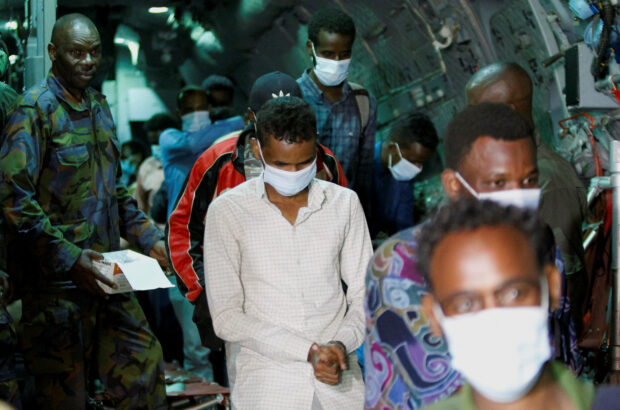
Evacuees from war-torn Sudan are processed by members of the Kenya Defence Forces (KDF) as they disembark from a military plane upon their arrival at the Jomo Kenyatta International Airport, in Nairobi, Kenya, April 24, 2023. REUTERS
KHARTOUM — Fighting in Sudan eased overnight after the army and a rival paramilitary force agreed to a three-day truce, allowing more Sudanese to flee on Tuesday and foreign countries to extract citizens.
The warfare that erupted between the army and the Rapid Support Forces (RSF) paramilitaries on April 15 has turned residential areas into war zones, killing at least 459 people, wounding over 4,000, and cutting water, power and food in a nation already reliant on aid.
Foreign countries have airlifted embassy staff out of Khartoum, the capital, after several attacks on diplomats, including the killing of an Egyptian attache shot on his way to work. Some countries are also extracting their private citizens.
On Tuesday, Britain launched a large-scale evacuation of its nationals on military flights from an airfield north of Khartoum. France and Germany said they had each evacuated more than 500 people of various nationalities.
Sudanese families too used the lull to emerge from their homes after more than a week of fierce fighting to search for transport to take them to safety, worrying that the exodus of foreigners would leave locals more at risk.
“Maybe the hardest moment is thinking about leaving the country,” said Intisar Mohammed El Haj, a resident of Khartoum who said her children had hidden under beds from the sound of explosions before the family fled to Egypt.
Tens of thousands have left in the past few days for neighboring Chad, Egypt, Ethiopia and South Sudan, despite the uncertainty of conditions there.
The situation for those remaining in Africa’s third-largest country, where a third of the 46 million people needed aid even before the violence, is deteriorating fast. Some expressed dismay at the departure of some international aid agencies and diplomats.
The United Nations humanitarian office said on Tuesday it had cut back activities due to the fighting.
‘Bodies in the streets’
One Khartoum resident, who declined to give his name, said he feared that with fewer international observers, fighting forces would show less respect for civilians.
Yassir Arman, a leading figure in the civilian political coalition the Forces for Freedom and Change (FFC), urged humanitarian organizations and the international community to help restore water and electricity, and send generators to hospitals.
“There are bodies scattered in streets and sick people who cannot find medicine, no water nor electricity. People should be allowed to bury their dead during the ceasefire,” he said.
Food, clean water, medicines and fuel are in short supply, U.N. agencies said, and communications and electricity are limited, with prices skyrocketing. Residents reported that a bus ticket to Egypt had jumped six-fold, to $340.
The RSF accused the army of violating the 72-hour truce agreed on Monday and of attacking its troops’ position at the presidential palace in Khartoum.
The foreign ministry accused the RSF of attacking diplomats, citing the killing of the Egyptian diplomat.
The Sudan Armed Forces (SAF) said the U.S. and Saudi Arabia had brokered the ceasefire. U.S. Secretary of State Anthony Blinken announced the agreement first and said it followed two days of intense negotiations. Several previous truces failed to last long.
A Reuters witness heard sporadic gunfire on Tuesday morning in the city of Omdurman, adjacent to the capital.
Ahead of the evening truce announcement, air strikes and ground fighting had shaken Omdurman, and there were also clashes in Khartoum.
Dark smoke shrouded the sky near the international airport in central Khartoum, near the army headquarters, and booms of artillery fire rattled the surroundings.
U.N. Secretary-General Antonio Guterres said that the violence in a country that flanks the Red Sea, Horn of Africa and Sahel regions “risks a catastrophic conflagration … that could engulf the whole region and beyond”.
RELATED STORIES

